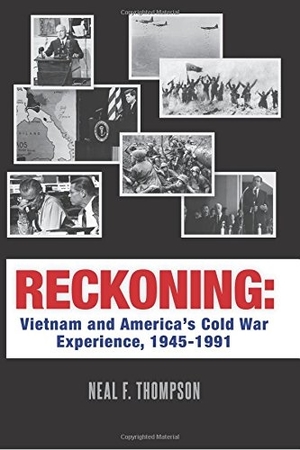Neal F. Thompson’s Reckoning: Vietnam and America’s Cold War Experience, 1945-1991 is a complicated, yet well-researched work of nonfiction. At first glance, this 500 + page book can be overwhelming for many. However, Neal has broken things down nicely by framing the work around the American president who was in power at the time. The book actually begins in the 30s, but quickly covers president Truman, Eisenhower, Kennedy, Johnson, Nixon, and Regan. The chapters following that are more a collection of essays reflecting on the conflicts and their impacts on American society and thought.
[alert variation=”alert-info”]Publisher: Charlevoix Books
Formats: Paperback, Kindle
Purchase: Amazon [/alert]
For those wondering, the book is heavily sourced, and I mean heavily! Nearly every page has a collection of footnotes. While this may have started as a passion project, Neal has definitely done his research. However, there was no comprehensive bibliography in the version we read, which could be disappointing for any reader who would like to do some of their own further research – as not everyone will remember to mark pages for relevant materials they find interesting while they read. The edition that was read for the purpose of this review was an Advanced Reader Copy, so please do keep this in mind as things may have changed for the final edition. The book does contain an index for anyone wondering about particular information or wanting to find specific subjects a bit more rapidly.
Nonfiction is hit or miss among readers, and one of the common concerns is audience. Dry nonfiction is likely to alienate a mainstream audience, but succeed with professionals, where books that are too niche or personalized are often resigned to a small, special interest readership. Reckoning falls somewhere in the middle – the book is engaging, but does require readers to take their time to digest the vast amount of information while also providing plenty of outside sources for people to find further reading should they be so inclined. Due to the breadth of time covered in the book, the information on individual events may be a bit vaguer than some readers would like, however, the book functions as an excellent summary of a complication span of US history. This is a book that is worth reading for readers looking for a less traditional look at the influences behind the Vietnam and Cold War.
[signoff predefined=”Sponsored Review Program” icon=”book”][/signoff]

